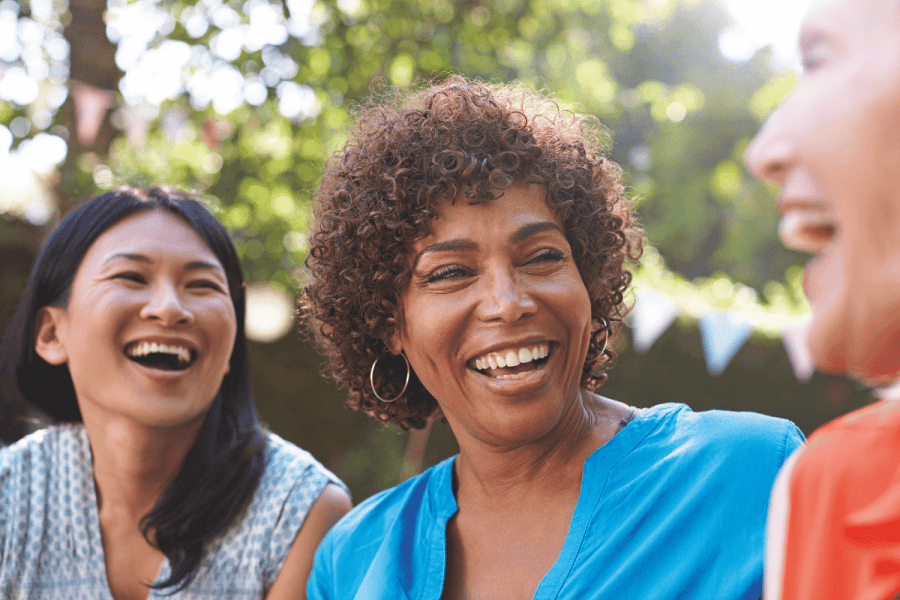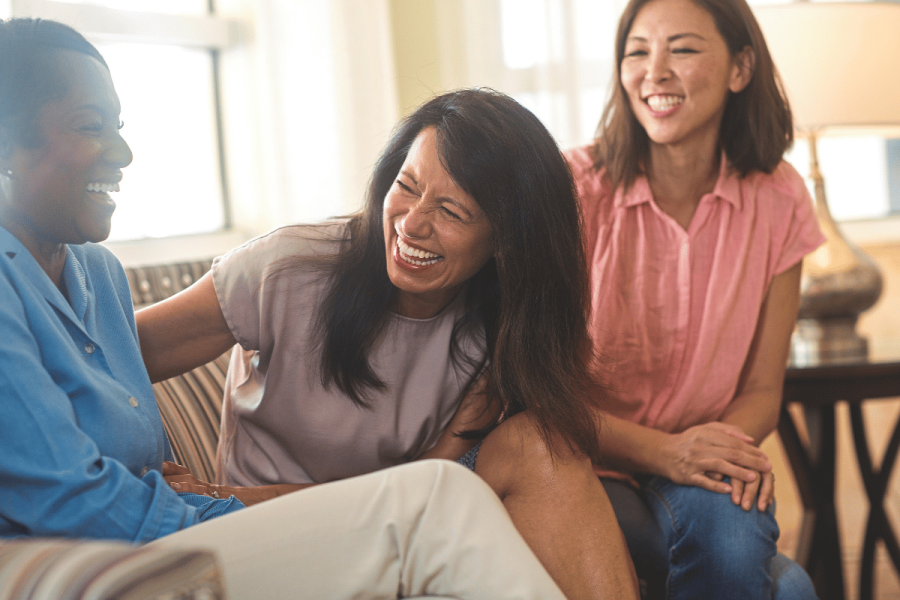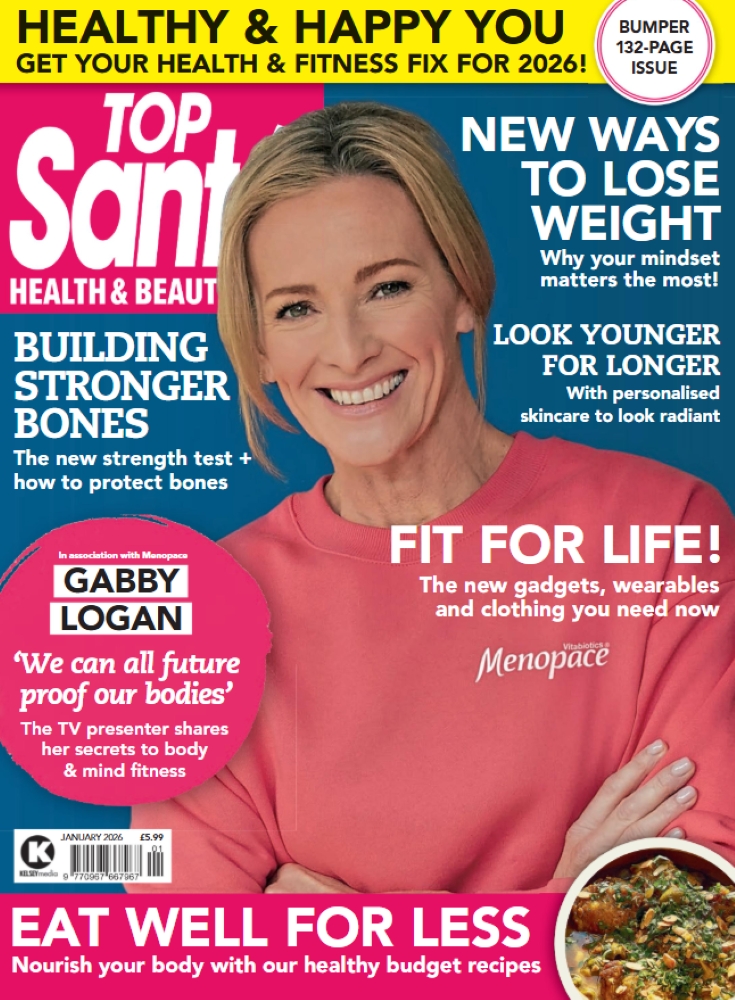For Menopause Awareness Month, Angela Kennedy talks to three inspiring women on how experiences of this life stage can vary for those from ethnic and minority backgrounds in the UK. Plus, we get insightful advice from two top meno doctors.
Words: Angela Kennedy. Images: Shutterstock; Rich Barr Photography for Karen Arthur.
Everyone’s experience of menopause is different. But if the menopause information space doesn’t feel inclusive to you and the sometimes one-size-fits-all healthcare doesn’t meet your needs, it makes navigating this life stage much more daunting.
‘When health services are not delivered in a culturally competent way, women can feel alienated or misunderstood, discouraging them from seeking support and leaving them to manage symptoms in silence,’ says Dr Itunu Johnson-Sogbetun, a GP, women’s health and menopause specialist, and author of A Personal Guide to Menopause for Black Women (drshocares.com).
Worryingly, this disconnect can even hinder access to treatment, with women from ethnic minority backgrounds less likely to be offered hormone replacement therapy. Research on how menopause affects women from varying ethnic backgrounds in the UK is limited, but some suggests symptoms can differ.
‘Black women often report more frequent and severe vasomotor symptoms, such as hot flushes and night sweats. South Asian women more commonly describe joint and muscle pain. East Asian women experience fewer hot flushes, but report headaches, shoulder stiffness or muscle tension. Ethnicity, culture and lifestyle factors shape menopause experience, so doctors should avoid assuming symptoms always follow a textbook pattern,’ advises Dr Itunu.
In fact, the age you reach menopause – 12 months or more without a period – can also vary. On average, it’s 51 years in the UK. However, some ethnic minority groups tend to experience it earlier.
‘Women of Caribbean or African origin typically reach menopause around 49.6 years. South Asian women in the UK also go through menopause earlier: Indian women around 46.7 years and Pakistani women around 47.2 years. Individual variation remains wide [as is evident from the case studies here] but recognising menopause can come earlier for some allows doctors to offer support sooner,’ says Dr Itunu.
Reasons for differing symptoms are likely due to socioeconomic factors, such as lifestyle, diet, weight, smoking and chronic stress – as well as genetics. ‘Research indicates epigenetics may also explain differences. For example, long-term exposure to stress, poor nutrition or disadvantage can leave biological “marks” that affect reproductive ageing and the timing of menopause,’ explains Dr Itunu.
Cultural differences
Another fuel for menopause inequalities is embarrassment or shame. While the burgeoning menopause information space has opened up the conversation for some women – often from white and middle-class backgrounds – little has changed for others.
‘In many communities, we simply don’t talk about it. In my own culture, there isn’t even a specific word for menopause. So, it’s difficult to seek help for something that doesn’t have a name. On top of that, there are taboos around reproductive health and social pressure that ties a woman’s value to her youth or fertility.

‘That silence makes it harder to speak up,’ says Dr Amina Hersi, GP and founder of PolyBiotics supplements for hormone health (polybiotics.co.uk). She suggests not waiting when it comes to seeking menopause healthcare. ‘Track early signs. Don’t wait for your periods to stop. Symptoms like poor sleep, low mood and brain fog may already be perimenopause.
‘Keeping a symptom diary can help your GP see the pattern. Ask to see a GP or nurse with training in menopause. If you feel dismissed, ask for a second opinion.’ Advocating for yourself is so important, agrees Dr Itunu. ‘Do not let cultural stigma silence you. Prioritise your wellbeing through good nutrition, physical activity, joyful activities and creating support networks. Remember, you deserve to feel well and to have your concerns taken seriously.’
‘Nothing prepared me for how my body changed’

Jennifer Stoute, 60, from Potters Bar in Hertfordshire is a former Olympic athlete and starred in the original Gladiators TV show as Rebel. She is now a director of sports agency Astra Partners (astrapartners.global). Find her at instagram.com/gorgeousfifties.
My perimenopause started quite late, at 52 years old, with irregular periods, hot flushes, night sweats and disrupted sleep. (If you’re dealing with disrupted sleep in menopause, read our tips here).
Some symptoms were a surprise, particularly the intensity of the hot flushes – that internal heat was crazy. However, my athletic background played a big role in helping me cope, especially with tiredness and fatigue. I took HRT for six months but developed polyps, so I stopped.
Since then, I manage my symptoms naturally, focusing on exercise, balanced nutrition and stress management. But nothing prepared me for how my body changed during perimenopause. One day I looked in the mirror and noticed I was holding onto weight in places I never had before. My waistline softened, my torso looked more square-shaped, and I wondered what was happening.
As an athlete, I’d always trusted my body. I knew how to fuel it and how to recover. Suddenly, all the old rules stopped working. The first thing I did was look at my gut health. I added a good probiotic, cut down on sugar and started paying closer attention to how food made me feel. The hardest shift? Giving up coffee.
My morning cup was my ritual. But my cortisol levels were sky-high and I felt anxious all the time. Within a few weeks of quitting, I felt calmer, less jittery, and more myself. I don’t eat meat, so fish and vegetables have become my go-to. More protein, fewer carbs. We should accept our bodies can’t eat the way they did when we were younger.
That’s not a bad thing – it’s just another step in life. Exercise had always been my therapy, but I had to admit hammering my body into the ground wasn’t helping anymore. Now, I do more strength training with heavier weights, enough cardio to keep my energy up, and when my body says stop, I stop.
Moving into post-menopause brought more subtle changes – my muscle tone, my skin, even how quickly I could bounce back. Recovery became slower, a bit more difficult. So, I’ve had to be consistent and strict, but not in a punishing way. To me, it’s not a chore – it feels like an honour to give back to myself. I think of it as passing the baton: from the young Jenny to the older Jenny.
I would like to see more diversity in menopause education campaigns, better GP training on how menopause can present differently across ethnic backgrounds, and more community-based resources that women can access without stigma. Without culturally relevant examples and advice, it can feel harder to relate to the guidance.

I also think girls should be educated from a younger age so they’re aware of the changes that can happen later in life. However, change isn’t something to fear. With every shift, I’ve learned more about patience, self-compassion and strength. It’s not about being who I was – it’s about being the best version of who I am now. That’s a journey I’m proud to be on.
‘Menopause care must be culturally competent’

Karen Arthur, 63, is a broadcaster, author and teacher from Hastings. Connect at instagram.com/thekarenarthur and listen to her podcast, Menopause Whilst Black.
The first perimenopause symptom I had was splitting up with my long-term partner. We’d been together for 20 years but the relationship was not good, so, at 44 years old, I decided: I’m not doing this anymore.
A big part of perimenopause is realising you don’t need to put up with negative stuff. I can see that now – although at the time I’d never heard of perimenopause. I loved my career as a teacher but, in my late 40s, I started forgetting words, such as table or chair. I didn’t realise brain fog could be linked to menopause.
I had hot flushes but just ignored them as I was scared of losing my job. But when I began forgetting about meetings, it impacted my career. Also, I suddenly had toothache and needed teeth extracted – I now know lower oestrogen in perimenopause can affect gum health. On top of this, I hadn’t dealt with the trauma of my break-up, so my mental health suffered and I was signed off work, eventually leaving the career I cherished.
I reached menopause at 52 but was still having symptoms, so I went to my GP. I told the doctor about my hot flushes and that I might be menopausal but they offered me anti-depressants rather than HRT. Women still tell me they are prescribed anti-depressants instead of HRT. Later, when I was more informed, I started menopause hormone therapy (the newer name for HRT) at age 58. (To learn about the benefits, risks, and side effects of HRT, read our guide here).
I still take progesterone and oestrogen; I don’t need testosterone, even though some friends swear by it – the point is we should be given choices. Too often we are dismissed by doctors and have to deal with bias assuming we are too young to be in perimenopause. Menopause care needs to be culturally competent.
I didn’t want my friends to suffer in silence as I had done, so I invited them (my midlife goddesses!) to my house, cooked us a curry, sat around my kitchen table and said: ‘I’m going through menopause. I know I’m not the only one, so let’s talk about it.’ We discussed the best and worst things about ageing.
We were all having similar symptoms but in different ways – some with night sweats and joint pain, which I never had. We swapped supplement ideas and supported each other. Then, I started my podcast because I saw so much wrong with the menopause space. Mostly it was very white and middle class – even today that hasn’t changed much.
Now, I’ve lost count of people who’ve stopped me on the street or messaged to say how my podcast helped them, including Black women who started HRT because I discussed taking it. The more diverse voices out there, the less alone we feel. Learn to love your body and remember, ageing is an absolute privilege. As rubbish as menopause can be, it’s also liberating. It gave me purpose to create a life I love.

‘Your life experiences influence your menopause journey’

Pamela Windle, 59, from Nottingham is a women’s health coach, and menopause and menstruation consultant for the workplace. Book a consultation at smarterchange.co.uk and listen to her podcast, 3D Women.
I’m actually still perimenopausal! The first time I skipped a period I was 53 but I was back to normal after that. Menopause arrives later for my family. I’m not sure when my perimenopause started as I developed chronic fatigue syndrome (CFS) at 45 years old, following a virus. So, this probably masked my perimenopause symptoms.
However, when my mum passed away a few years ago, I had horrendous hot flushes and night sweats – the bed was drenched. Not sleeping properly was exhausting. I’d seen my elder sister have hot flushes years before but we didn’t speak about it. Luckily, I’d been training for qualifications in women’s health to help cure my CFS, so I managed to reduce the hot flushes by changing my diet.
I stopped having smoothies for breakfast, which lack fibre and protein, and started having proper meals for breakfast, lunch and dinner – such as meat and broccoli or cauliflower, or fish and veg. I don’t eat gluten anyway and I removed sugary food from my diet – including the more sugary fruit, such as bananas and grapes. I was walking lots too.
I decided to try HRT in 2023 to see what it was like but my GP didn’t take a full medical history when prescribing. I have fibroids so I bled very heavily on oestrogen and progesterone HRT, as oestrogen can feed fibroids. I had to stop taking it. A hospital scan found my fibroids had grown massively. My skin looked younger while on HRT though, so I can see why people like it.
But I should have been started on a much lower dose. I think menopause education is lacking – there’s no real research on what it is to be Black British and how menopause affects you. Women don’t just reach menopause in isolation, they may have other issues, such as CFS, polycystic ovary syndrome or fibromyalgia – then racism and sexism add on an extra layer.
Menopause can be tough, but I don’t like the idea of saying Black women have worse menopause experiences as this becomes a self-fulfilling prophecy. It stops women from seeking medical help – because they expect to feel bad – so then they are under-served even more. It’s essential to consider the whole person rather than just saying your hormones change.
All your life experiences influence your menopause journey. My advice is to focus on what you are putting into and onto your body. For example, some hair products often used by Black women, such as relaxants, are endocrine disruptors, which are bad for your hormones. The same goes for certain nail varnishes, make-up and cleaning products.
Switch to natural products – there are lots more available now. If your stomach is growing, you’re not lazy. It’s a metabolic disorder. Try lowering your insulin and cortisol levels by moving after meals – switch on music and dance for 10 minutes. Build movement into your day. My most recent period was May of this year – so I’m thinking that might have been the final one, then I’ll be in menopause.
YOUR EXPERTS

Dr Itunu Johnson-Sogbetun is a GP, menopause specialist and author of A Personal Guide to Menopause for Black Women (drshocares.com).

Dr Amina Hersi is a GP and founder of PolyBiotics, a range of supplements for hormone health (polybiotics.co.uk).







